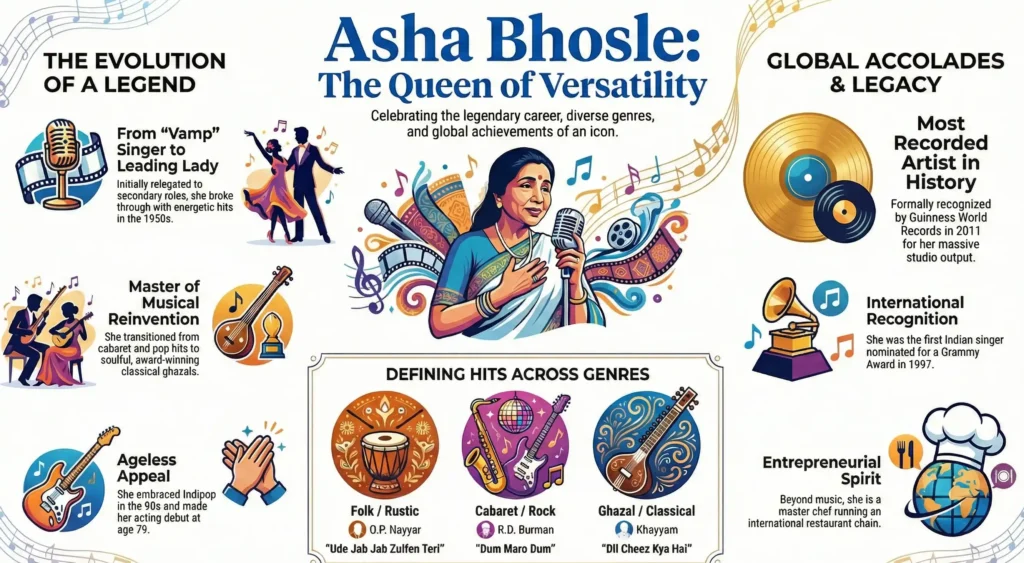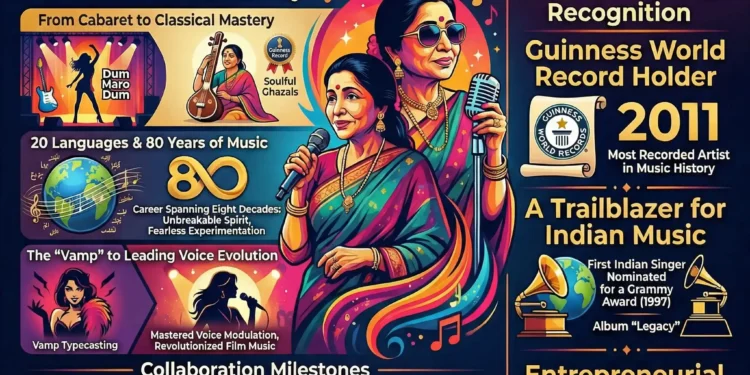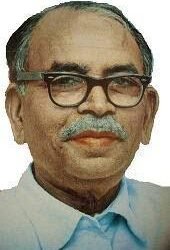Asha Bhosle, born in 1933 in Sangli, Maharashtra, is one of the most celebrated playback singers in Indian history. Part of the musical Mangeshkar dynasty, she began her career at age 10 to support her family. Often relegated to singing for vamps and supporting actresses early on, she carved a niche for herself with her bold, sensual, and energetic voice. Her collaborations with O.P. Nayyar and later her husband R.D. Burman revolutionized film music. With a Guinness World Record for the most studio recordings, a Dadasaheb Phalke Award, and a Padma Vibhushan, her career spans over eight decades and 20 languages.| Attribute | Details |
| Full Name | Asha Mangeshkar (Asha Bhosle) |
| Date of Birth | September 8, 1933 |
| Birthplace | Sangli, Maharashtra, India |
| Profession | Playback Singer, Entrepreneur, Actress (Child Artist) |
| Debut Song | “Chala Chala Nav Bala” (Marathi, 1943) |
| Key Awards | Dadasaheb Phalke Award (2000), Padma Vibhushan (2008), 2 National Film Awards, 7 Filmfare Awards |
| Spouse | Ganpatrao Bhosle (1949–1960), R.D. Burman (1980–1994) |
| Siblings | Lata Mangeshkar, Hridaynath Mangeshkar, Usha Mangeshkar, Meena Khadikar |
| Notable Songs | “Dum Maro Dum”, “Piya Tu Ab To Aaja”, “Dil Cheez Kya Hai”, “Chura Liya Hai Tumne Jo Dil Ko” |
Early Life: A Musical Heritage

Born into the illustrious Mangeshkar family in the village of Goar, Sangli, Asha’s early life was steeped in music. Her father, Pandit Deenanath Mangeshkar, was a classical singer and actor who laid the foundation for her musical journey. However, tragedy struck when he passed away when Asha was just nine, forcing the family to move from Pune to Kolhapur and finally to Mumbai. To make ends meet, Asha and her elder sister Lata Mangeshkar began singing and acting in films. Despite the hardships, the bond between the siblings and their shared passion for music kept them going.
8 Defining Chapters in the Vikram Sarabhai Biography
The Struggle and The Breakthrough
Asha’s entry into playback singing was fraught with challenges. With established singers like Lata Mangeshkar, Shamshad Begum, and Geeta Dutt dominating the scene, Asha was often given songs for vamps or B-grade films. Her first big break came in 1956 with O.P. Nayyar’s C.I.D., followed by the massive success of Naya Daur (1957). Unlike her contemporaries who specialized in soft, romantic numbers, Asha brought a fresh, vibrant energy to her songs, proving she could sing anything from a bhajan to a rock-n-roll number.
The R.D. Burman Era: Defining Cool
Her collaboration with R.D. Burman (Pancham Da), whom she later married, created a new sound for Bollywood. Together, they delivered iconic hits like “Dum Maro Dum” (Hare Rama Hare Krishna), “Piya Tu Ab To Aaja” (Caravan), and “Chura Liya Hai Tumne Jo Dil Ko” (Yaadon Ki Baaraat). This era established her as the “Queen of Cabaret” and showcased her incredible vocal range and adaptability.
Reinvention: From Pop to Ghazals
Just when the industry typecast her as a pop/cabaret singer, she stunned everyone with her rendition of soulful ghazals in Umrao Jaan (1981). Songs like “Dil Cheez Kya Hai” won her the first National Film Award, proving her prowess in classical and semi-classical genres. In the 90s, she reinvented herself yet again with the Indipop album Janam Samjha Karo and collaborations with boy bands, appealing to a whole new generation.
6 Unfoldings in the Subrahmanyan Chandrasekhar Biography
Personal Life & Resilience
Asha’s personal life was a rollercoaster. She eloped at 16 with 31-year-old Ganpatrao Bhosle, a decision that estranged her from her family for years. The marriage was troubled, and she eventually returned to her maternal home with two children and pregnant with a third. Years later, she found love and musical companionship with R.D. Burman. Through it all—financial struggles, single motherhood, and professional rivalry—her spirit remained unbreakable.
7 Secrets of Padmanabhaswamy Temple Treasure
Quick Comparison: The Versatility of Asha
| Genre | Key Composer | Defining Hits | Impact |
| Folk/Rustic | O.P. Nayyar | “Ude Jab Jab Zulfen Teri” | Established her as a lead voice; broke the monopoly of other singers. |
| Cabaret/Rock | R.D. Burman | “Dum Maro Dum”, “Piya Tu” | Redefined the “modern Indian woman” sound; introduced Western vocal styling. |
| Ghazal/Classical | Khayyam | “Dil Cheez Kya Hai” | Proved her classical mastery; won National Award. |
Curious Indian Fast Facts
- World Record Holder: In 2011, she was officially acknowledged by the Guinness Book of World Records as the most recorded artist in music history.
- Master Chef: Asha is an excellent cook and runs a successful chain of restaurants called “Asha’s” in Dubai, UK, and other locations.
- The “Vamp” Singer: In her early years, she was the go-to voice for vamps (villains/dancers) like Helen, which allowed her to experiment with voice modulation more than lead heroines.
- Acting Debut: At the age of 79, she made her acting debut in the Marathi film Mai (2013), playing a mother suffering from Alzheimer’s.
- Grammy Nomination: She was the first Indian singer to be nominated for a Grammy Award in 1997 for her album Legacy with Ustad Ali Akbar Khan.
Conclusion
Asha Bhosle is not just a singer; she is an institution. Her ability to adapt to changing times—from the vinyl era to the digital age—makes her unique in the annals of world music. Whether she is crooning a melancholic ghazal or belting out a disco anthem, her voice carries a zest for life that is infectious. Her story is a testament to the fact that talent, when combined with fearless reinvention, creates a legacy that is truly timeless.
10 Remarkable Facts About Meghnad Saha Life and Achievements
If you think you have remembered everything about this topic take this QUIZ
Results
#1. In 2011, the Guinness Book of World Records officially acknowledged Asha Bhosle for holding which record?
#2. For which film did Asha Bhosle win her first National Film Award, celebrated for her rendition of soulful ghazals?
#3. Who was Asha Bhosle’s first husband, with whom she eloped at the age of 16?
#4. At the age of 79, Asha Bhosle made her acting debut in which Marathi film?
#5. Which legendary music composer, who later became her husband, collaborated with her on hits like “Dum Maro Dum” and “Piya Tu Ab To Aaja”?
#6. Apart from singing, Asha Bhosle runs a successful chain of restaurants internationally called:
#7. In 1997, Asha Bhosle became the first Indian singer to be nominated for a Grammy Award for which album?
#8. Which music director gave Asha her first big break in 1956 with the film C.I.D.?
Who is Asha Bhosle’s sister?
Her elder sister is the legendary playback singer Lata Mangeshkar.
How many songs has Asha Bhosle sung?
She has recorded over 12,000 songs in more than 20 languages.
was Asha Bhosle’s second husband?
She was married to the famous music director R.D. Burman from 1980 until his death in 1994.
Does Asha Bhosle have a restaurant?
Yes, she owns a successful global restaurant chain named “Asha’s,” famous for its Indian cuisine.
Which song won Asha Bhosle her first National Award?
She won her first National Film Award for the song “Dil Cheez Kya Hai” from the movie Umrao Jaan (1981).
Read More: https://curiousindian.in/mohammad-rafi-the-voice-of-a-million-emotions-december-1924-july-1980/








